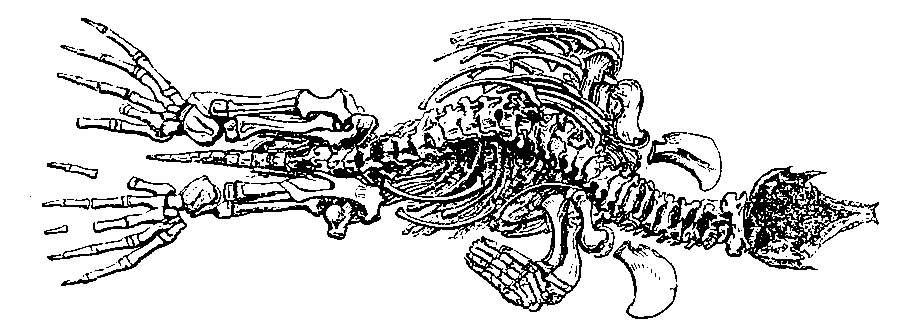|
|
| Oct/Nov 2016 • Nonfiction |
|
|
| Oct/Nov 2016 • Nonfiction |

Newspapers, Marshall McLuhan once observed, are among the 20th Century's most astonishing objects. He regarded the front page as reflecting an implicit worldview. It contains parts of, say, a dozen articles lined up in columns, each of which presents information concerning local, national, and international events. All these articles are juxtaposed without sense of their interrelatedness, no indication of relative magnitudes of importance, no suggestion as to the way time connects them.
It is not history we are reading, but a surreal congeries of chronicles announced by the blare of headlines, followed by some few hundred words or less of coherent reporting that peter out elsewhere, on a page usually more than half-composed of advertisements for consumer goods, where remnants of other reports that began on other pages have been distributed as space-filler. The only common denominator to what appears on the front page is the date of publication.
It was not until recently that I began to appreciate what an extraordinary thing it is to unfold the newspaper at the breakfast table and commence to read—all the while eating with a citizen's iron calm, buttering the toast, cracking the boiled egg necessary to one's existence, and pouring out a cup of coffee with an unfaltering wrist. I was recalling a day long ago when my wife and I were engaged in this daily ritual. Our eight-year old son appeared in the doorway and murmured something as we were offering a running commentary on the news, announcing headlines and reading aloud choice bits of articles. "What did you say?" I asked him. Very quietly he repeated his question: "What are the terrors for today?"
We put our portions of the paper down and looked at him. The expression he wore startled us. His eyes were open, unfocused, fixed. Suddenly, I understood. So immersed had we been in our daily routine, we never noticed that he had been listening, day after day, to our recital of the news. How grotesque it must've sounded to a child, and how frightening! Outside, the sun of Southern California sparkles on the green lawns. Inside, the household is tranquil. And there in that pleasant kitchen sit two grownups, his parents, filling the first hour of the day with descriptions of global disasters, social catastrophes, awful accidents, and death. And then the same grownups fold the newspaper, rise smiling from the table, and drive off to work as usual.
Who knows what anxieties filled our son's thoughts as he walked to school after that daily briefing on the situations and nature of the world?
Many millions of people start their day with a glance at the front page. Surely this is a remarkable, even a heroic thing to do. That we can withstand the terrible news usually contained on the front page must owe something to steady, modest, banal heroism, common to each one of us. And yet, sooner or later, there comes a headline that makes such heroism no more than a permanent state of rational delirium. Sooner or later there comes a news item that predicts and prophesies our fate. And still, the chances are that it is not spelled out in letters as clear as those that Dante read over the gate of hell: Abandon all hope...
If my son were to stand at the threshold of the kitchen and again ask his fearful question, I'd have a ready answer for him. I would unfold the paper to some back page where I have spotted a short but portentous news item.
Ten years ago Soviet scientists mounted a listening post for radio signals originating from somewhere in the galaxy. Instead of hunting (mathematically) in likely directions, they focused on the entire celestial hemisphere during each 24-hour scan. Thus, they tuned in on the whole of the island universe that we call the Milky Way. Tass news agency now reports that the results of the long survey are negative. The Times headline read: "Doubt Civilizations Exist. Soviets Pick Up No Signals From Stars." The Soviet scientists concluded there are no "supercivilizations," and probably not even any "primitive" ones. The Soviets suppose, reasonably, that if there were any civilized beings at all, advanced civilizations would've had to have developed. If we fail to discover them, this means there are no such civilizations in existence. And the same conclusion is suggested because of the absence of any trace of visits to Earth by extraterrestrial beings.
The director of the project, Vsevolod Troitsky, says that there is some slim chance that civilizations might exist, but they lack man's technology: Evidently their level is not so far high enough to enable them to spread throughout the galaxy or to start sending powerful signals.
Such a news item will take time to penetrate our consciousness, distracted as most of us are by today's terrors. What it suggests is that humanity is alone in the Milky Way. Americans once set foot on the moon; the Soviets and Americans have sent robot probes to the surface of Mars and Venus; Americans have rocketed a small craft past Saturn. But the chance that we—humanity—will ever leave the solar system is so remote as to be nonexistent. The popularity of science-fiction fantasies and film fables with spectacular special effects may demonstrate a yearning for other worlds, but that is only another form of mass entertainment. Humanity is alone. It always has been alone, and it will remain utterly alone.
If we place our engineering feats in perspective, we may realize that there are certain adjustments our societies must make, that each one of us will have to make, not merely to preserve human existence, but also to face our life here. Can it be done?
Open to the front page of any newspaper. First, consider that humanity is alone in this galaxy. Now, read.